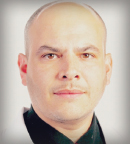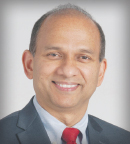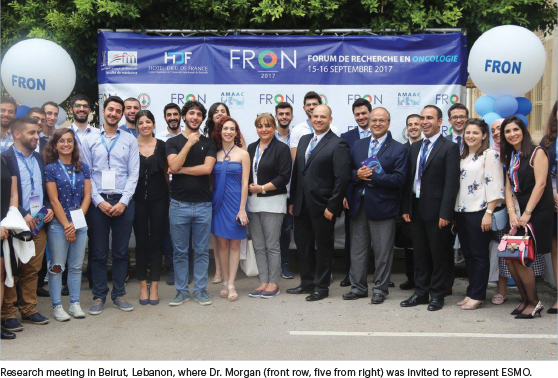In this installment of The ASCO Post’s Living a Full Life series, guest editor Jame Abraham, MD, FACP, spoke with Gil Morgan, MD, a clinical oncologist formerly at the Division of Medical and Radiation Oncology at Skåne University Hospital, Lund, Sweden and now full-time Director of the OncoAlert Network. Dr. Morgan has been Chair of the European Society for Medical Oncology (ESMO) Social Media Working Group and previously served on the ESMO Membership Committee and the Global Policy Committee, all for 4-year terms. He is mostly known for being the creator and Director of the OncoAlert network, which aims to promote oncology education through social media and is a proud ongoing collaborator with ASCO and many other oncology societies.
A born-and-bred Texan, Dr. Morgan is a product of The University of Texas (UT) educational system, who decided he wanted to experience practicing medicine in another country. So, he packed up his bags one day and booked a flight to northern Sweden, where he soon started working.
Gil Morgan, MD

On his residency at Karolinska and Lund University Hospital: “My oncology residency in Karolinska and Lund was an enriching experience that allowed for a lot of growth, both personal and professional. Karolinska and Lund are amazing places, just full of intellectual energy. It was also a lot of fun, as much as residency can be.”
On the Swedish and U.S. medical systems: “A lot of the differences with our systems are cultural and how the two cultures react to the system itself. But when it comes down to the actual medical part, there are no differences. It’s almost the same drugs that we use on a daily basis. For the most part, the cancer treatments are the same.”
On creation of OncoAlert: “OncoAlert is a worldwide network of oncology professionals and patient advocates. We launched it informally at the 2019 AACR Annual Meeting with targeted tweets and now it’s an established nonprofit nongovernmental organization and charity. From the start, we literally had no followers, but lo and behold, after having a daily presence and interacting with our colleagues (doctors, nurses, scientists, and patient advocates), it began coming together.”
“I grew up in El Paso until high school, after which I moved with my parents to San Antonio. Of course, I went to different schools afterward but was always a proud product of the UT system,” Dr. Morgan explained. “I come from a medical family, so it definitely gave me an idea to become a doctor, actually a clinician scientist. So, I started off in molecular biology, landed a fellowship at the National Institutes of Health (NIH) and really liked it, but then I realized there was something missing in my life. I wasn’t too sure what it was, but I believe it was the patient-doctor relationship, and I knew if I kept going in the molecular biology path, I probably was not going to have it.”
Dr. Morgan continued: “Both grandparents, my dad, an uncle, and an aunt are doctors, and then that’s just my close family. There are three other doctors in the extended family unit. During holiday get-togethers, there was a whole bunch of medical talk. It normalized the idea of medicine as a career. Two years into my fellowship at NIH, I decided to make the switch from biology to medicine. Not only was medicine fascinating to me, but I saw how it could definitely bring so much meaning to one’s life in a way other careers didn’t. The people I have met in medicine, especially in those formative years, reinforced the fact that if you do something you love, you wake up every morning eager to go to work and eager to make a difference in your patients’ lives.”
Family First
After attaining his undergraduate degree from The University of Texas San Antonio, and after his 2-year fellowship at NIH, Dr. Morgan traveled to Boston, where he started his medical education at Boston University (BU) Medical Campus; however, shortly after the end of his first year in Boston, a family medical emergency intervened. “My mom got sick and needed to have a serious operation, so I decided to leave BU and return to Texas to support her. I enrolled in a PhD program at Texas Tech Health Science Center, which was fairly near home, and I could see my mother on the weekends,” said Dr. Morgan.
As his mother recovered, Dr. Morgan left his PhD program and went on to continue his medical education and afterwards started looking for residency programs. “The spot I set my sights on was taken, so I was a bit frustrated,” he added. “Out of the blue, a friend of mine who’d married a Swedish woman asked if I would consider a residency program in Sweden. It seemed a bit far-fetched, but we had a serious talk about medicine and quality of life, and he was really happy in Sweden. He kind of dared me to give it a shot. I said, sure, but only if he lined something up for me. To my surprise, he did, and I went there for a few months and really liked it. My friend encouraged me to stay for a year or so to immerse myself in the Swedish system. There was nothing holding me back at the time, so I figured, why not?”
GUEST EDITOR

Jame Abraham, MD, FACP
When asked whether language presented a challenge for Dr. Morgan, he explained that when he first relocated to Sweden that his skill of the Swedish language was “nonexistent” but the hospital where he was working was very tolerant. He added: “During my first month at the hospital, my colleagues and others spoke English when around me and during rounds. Then slowly they brought me into learning and understanding more Swedish. I learned the language by myself, along with using a dictionary and translating everything I could get my hands on. By around 6 months I was able to see patients by myself. All of my training programs and boards have been in Swedish.”
Dr. Morgan said there was one real issue to deal with: the weather. “Winters in San Antonio are about 75° to 80°F, and in Sweden, it’s like 35° below 0! I remember driving to the hospital for training,” he related. “It was after 9:00 AM and still pitch black and freezing. I thought, I’m a guy who grew up under the Texas sun, what am I doing here?”
According to Dr. Morgan, he “survived the cold and dark winters of Sweden,” so after those 2 years were up and it was time to come home to the states, he was invited to start an oncology residency at Karolinska University Hospital. “With the amazing reputation Karolinska has worldwide, this was a great opportunity and one that I could not pass up, so I stayed.” Although his residency started in Karolinska, it ended in Lund University Hospital, both amazing places that were just gleaming with intellectual energy. It was also a lot of fun, as much as residency can be. During residency, Dr. Morgan developed a very strong interest in the field of cancer prevention and was able to enroll in training programs at the National Cancer Institute (NCI) in Maryland and at the MD Anderson Cancer Center in Houston.
Change of Plans
In 2016, Dr. Morgan had decided to return to the United States and rejoin the NCI for further work in cancer prevention, a field he’d become passionate about. But his plans changed when he met a young anesthesiology resident from Lithuania who was on an Erasmus exchange program. “A friend introduced me to this young doctor named Vytaute, who was new in the area and didn’t know anyone,” Dr. Morgan shared. “Little did I know at the time, she would be the reason I remained in Sweden. We dated and then married and now have two beautiful children, Gilbert Morgan, Jr, and Emily Morgan. She is my rock.”

Dr. Morgan continued: “We try to travel back to Texas as much as we can, to keep the connection between our kids and my family. During the 3 years of the COVID-19 pandemic, I didn’t get to see my parents. It seems like a lifetime, but we are trying to make up for it now. I just spent 2 weeks with Junior in Texas this August, and then the whole family is going again for Thanksgiving, and I think my parents are coming to Sweden early next year. We definitely do our best to get back stateside; after all, no matter what, it will always be home to me. It’s funny but even though my son has been raised in Sweden, I just see him like the most normal American little boy and when asked where he is from, he always answers proudly, “I’m from Texas.” He identifies with Texas, more so than the United States, which is interesting since he is born and raised in Sweden. And, of course, mommy speaks Lithuanian, so it’s kind of an international household, which is pretty cool.”
Swedish vs U.S. Medical Systems
Asked to compare the Swedish and U.S. medical systems, Dr. Morgan responded: “A lot of the differences between our systems are cultural and how the two cultures react to the system itself. But when it comes down to the actual medical part, there are very few differences. It’s almost the same drugs that we use on a daily basis. Sure, you have the U.S. Food and Drug Administration and the European Medicines Agency, and there might be certain drugs that take a little bit longer to get here. But, for the most part, the cancer treatments are the same. We have our own guidelines, but the guidelines we follow are based on, more than likely, the American and probably European ones. So, there’s not a huge difference in the way we practice.”
Dr. Morgan dug deeper into the cultural differences between the United States and Sweden, explaining that unlike the vast melting pot of America, Sweden is more homogeneous. Asked to identify a cultural aspect in Sweden that overlaps with the practice of medicine, Dr. Morgan commented: “The country is divided into three regions, North, Central, and Southern, and each one has slightly different takes on life. Up North, perhaps because of the demands of the climate there, I guess they’re crustier than in the Central and South; maybe they’re the Texans of Sweden. For example, I had a patient who was having a heart attack and was hooked up to an electrocardiogram. Despite his condition, he said he needed to leave so he could watch an important hockey game! I had to convince him I would put it on the TV in the ER, so he would not leave. Imagine that.”
Dr. Morgan shared another interesting cultural trait of Swedes: “They are very humble in nature and don’t like to bother people,” he explained. “And that goes for patients as well. I have to convince them that bothering me about their symptoms and health concerns is part of my job. I have been here for about 12 years now and don’t think about cultural differences anymore; it all comes naturally. Swedes are very friendly, but in a different way than Americans. There’s not as much small talk, and they’re big on efficiency.”
OncoAlert
Dr. Morgan is the founder and Director of OncoAlert, a worldwide network of oncology professionals and patient advocates with the common goal of reducing the burden and suffering of cancer. Dr. Abraham asked Dr. Morgan to elucidate on his role in the organization and his active social media presence.
“OncoAlert started in 2019,” he said, “but if you look at the actual involvement I had in social media, it went back to the end of 2016, when the idea blossomed after talking to several of my colleagues. My colleagues in many other places in Europe were commenting about how hard it was to keep abreast of new innovations and trends in oncology, largely because the information was spread out among so many journals. I had already been engaged in social media and enlisted about 15 associates who were active on Twitter and other social media outlets. I believe we launched OncoAlert informally at the 2019 American Association for Cancer Research (AACR) Annual Meeting with targeted tweets. We literally had no followers, but lo and behold, after several meetings it began coming together.”
Dr. Morgan continued: “Social media has a really huge role to play in medicine. I often call it the great equalizer because especially with the COVID-19 pandemic, we actually discovered it really didn’t matter where in the world we are, we had access to the same information. Now that we’re returning to in-person and hybrid meetings, I think oncology social media can definitely help us keep connected and constantly inform each other. OncoAlert is a good example of that, because it is a network that has brought people together. It’s beautiful because it just originated as a grassroots movement with no money or large organization behind it.”
A New Chapter for OncoAlert
According to Dr. Morgan, juggling his position as Director of OncoAlert with his challenging career in clinical oncology forced him to make some difficult decisions about a year ago. He explained: “Either I settled with the fact that OncoAlert would remain static, or we would double down on the movement we created and invest in its future to help it grow. After a long internal battle, in June, I left my clinical practice and established OncoAlert 360 as a nonprofit nongovernmental organization and charity. In short, if I wanted to take it to that next level, it was way beyond my wallet. Honestly, the decision to leave clinical work at the hospital and assume the position as Director of OncoAlert was the hardest decision of my life. But I like to remind myself that I’m not giving it up forever, because I do burn for medicine, and it does make me happy.”

Future Initiatives
Dr. Morgan stressed that OncoAlert is an organic organization that evolves in similar fashion to the changing oncology landscape. “I would like to share one of the initiatives we have and that’s the OncoAlert Consortium, a super think tank targeted at developing more educational opportunities in areas of need. To that end, we launched as a consortium of 15 national oncology societies almost entirely from low- and middle-income countries under the umbrella of OncoAlert. We’ve also set up a number of fellowships, advocacy initiatives, and are proudly collaborating with our friends at ASCO. We are just now in the formative stage, but I think it’s going to allow us not only to produce good science, but to develop educational endeavors targeted to these countries and promote local talent from these societies.”
Asked about other future initiatives, Dr. Morgan replied: “First is the promotion of oncology education to reduce disparities. Next is to amplify the position of our patient advocates and make sure we keep people in the community up to date on the latest news and innovations in oncology. Those efforts are enormous, given the scope of our audience and the rapid changes we see in oncology. Plus, being a nonprofit organization also means we have to maintain a concerted effort to keep the internal machinery in order and running. Until recently, all the costs generated by OncoAlert have been financed by me. But now we have partners coming on. This latest colloquium, which is our end of the year virtual meeting on the best of oncology in that year presented by an amazing OncoAlert faculty, had ASTRO, ECO, SWOG, ESGO, MASCC, SIOG, eCancer, EONS, and the European School of Oncology as partners. The 2022 OncoAlert colloquium achieved 11,000 viewers by ASCO 2023, which is amazing for an event with no funding and driven entirely by oncology professionals.” With the 2023 Colloquium coming up in January 2024, we are positive we can reach 15,000 viewers or more, all in the name of amplifying oncology education to the best of our abilities.”
Balancing Work and Home
How does a super-busy leader in oncology balance his work and off-work life? “Life is great, and there is balance in that. I’ve been blessed with a wonderful wife and two amazing kiddos. OncoAlert actually takes over my leisure time. So since leaving the clinic, most of the time I am either with the family or just behind the computer working on some OncoAlert activity. In fact, there’s a running joke that OncoAlert is my third child. Whenever I do decompress, it’s normally just spending time with the family, having a nice meal with them, going out or watching a movie, or just talking. My family is my everything, and thanks to them I’m at peace.”
Words of Advice
Asked for some words of advice for young oncologists just beginning their careers, Dr. Morgan commented: “Make sure that whatever you do, you love it. Anything worth doing is going to be hard. Oncology is something very special, and it takes a very special person to go through the highs and the lows. The lows can be quite tough psychologically, emotionally, but the highs and the ability to help patients and entire families make it all worth it. In the end, it’s all about our patients. The one thing I would not trade for anything is the solemn obligation we have to our patients with cancer. What makes our profession so beautiful is the unique doctor-patient relationship, that is deeper and more personal than anything else in medicine.”

